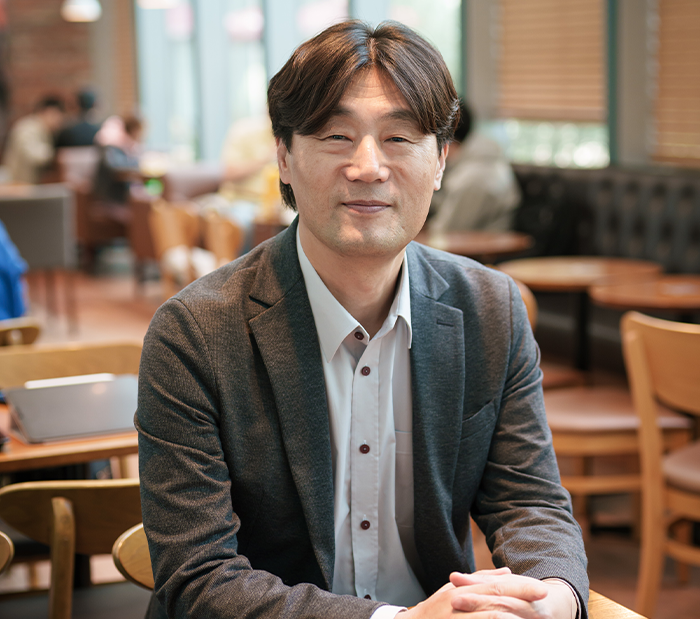Research Stories
Recharge your life with caffeine,
now as a energy storage materials
New report on the possibility of caffeine as a lithium-ion battery anode material
Demonstrating the potential of caffeine molecules as energy storage materials, first identifying reaction mechanisms, and further presenting a new perspective and approach to implementing high-energy secondary batteries through functional group tuning of caffeine molecules
Energy Science
Prof.
YOON, WON SUB
Research Professor Wontae Lee and Professor Won-Sub Yoon
Research Professor Wontae Lee and Professor Won-Sub Yoon, at Sungkyunkwan University, report on the potential of caffeine as a cathode material for lithium-ion batteries for the first time. In addition, they identified the fact that high energy and fast charging speed can be secured according to the design of electrodes and molecules.
The phenomenon of climate change felt on the skin has instilled a sense of crisis beyond lukewarm interest in environmental issues, and has further emphasized the importance of eco-friendly energy storage and conversion systems. Currently, cathode materials of lithium-ion batteries are mainly composed of transition metal-based inorganic compounds, and the amount of usage is further expanding with the blooming of the electric vehicle market. As a result, cost and sustainability concerns are growing due to finite and localized metal reserves. As an alternative to this, organic energy storage materials composed of elements abundant in nature, such as H, C, N, O, and S, are emerging.
Caffeine (1,3,7-trimethylpurine-2,6-dione) is the most consumed psychoactive drug in modern society and is a xanthine alkaloid derivative. It is mainly contained in the coffee or tea we drink and shows the awakening effect. The researchers investigated the potential and reaction mechanism of caffeine as an energy storage material through an optimized electrode design. In this study, caffeine can store and release a total of 2 mol of lithium ions, and has a high capacity of more than 200 mAh/g even after 100 charge/discharge cycles. In addition, it shows fast charging, which is about 50% charged in 6 minutes. Furthermore, they identified the energy storage reaction mechanism of caffeine as an electrode material for lithium-ion batteries for the first time. However, Research Professor Wontae Lee added that there are still many issues to be solved in order to design electrodes at a commercial level due to the prototype electrode design designed for the purpose of analyzing the reaction mechanism.
In addition, by showing that additional energy storage sites can be activated through molecular tuning of caffeine, the researchers demonstrate new possibilities for designing high-energy lithium-ion secondary batteries based on existing organic compound materials and suggest strategic directions.
Research Professor Wontae Lee explained the research story with "When I was in graduate school, I saw a report in a medical paper that I came across by chance that caffeine consumption lowered the level of lithium-ion in the blood in addition to the wakefulness effect. At the time, without any basis, I started research with a simple thought, ‘If caffeine accepts lithium through an oxidation-reduction reaction, it can be used as an energy storage material’, but it was stopped because no practical results were obtained. However, with the passage of time, after receiving my Ph.D., I was able to actively conduct research with the support of the Sejong Science Fellowship and my advisor, Professor Won-Sub Yoon. Through the help of excellent researchers who accompanied me in this process, I was able to realize my vague imagination into reality.”
Along with this, Professor Won-Sub Yoon said, “Currently, the main materials in the secondary battery market are inorganic compounds based on transition metals, such as high-content nickel-based layered materials. Due to their limited reserves, these metals will soon create problems such as high cost and sustainability concerns. As an alternative to this, although development is currently slower than transition metal-based materials in terms of commercialization, the development of organic electrode materials made of elements that exist infinitely in nature will be a very attractive strategy in terms of sustainable development."
This research, conducted by Research Professor Wontae Lee and Professor Won-Sub Yoon of the Department of Energy Science, was selected as the exclusive front cover of 'Energy Storage Materials (IF 20.831, Top 2.54% in Materials Science, Q1)', a world-renowned academic journal in the field of materials science. (Volume 56/ 2023.02.17.)
Energy storage mechanisms of caffeine molecules and strategies for activating new reaction sites through halogenation


